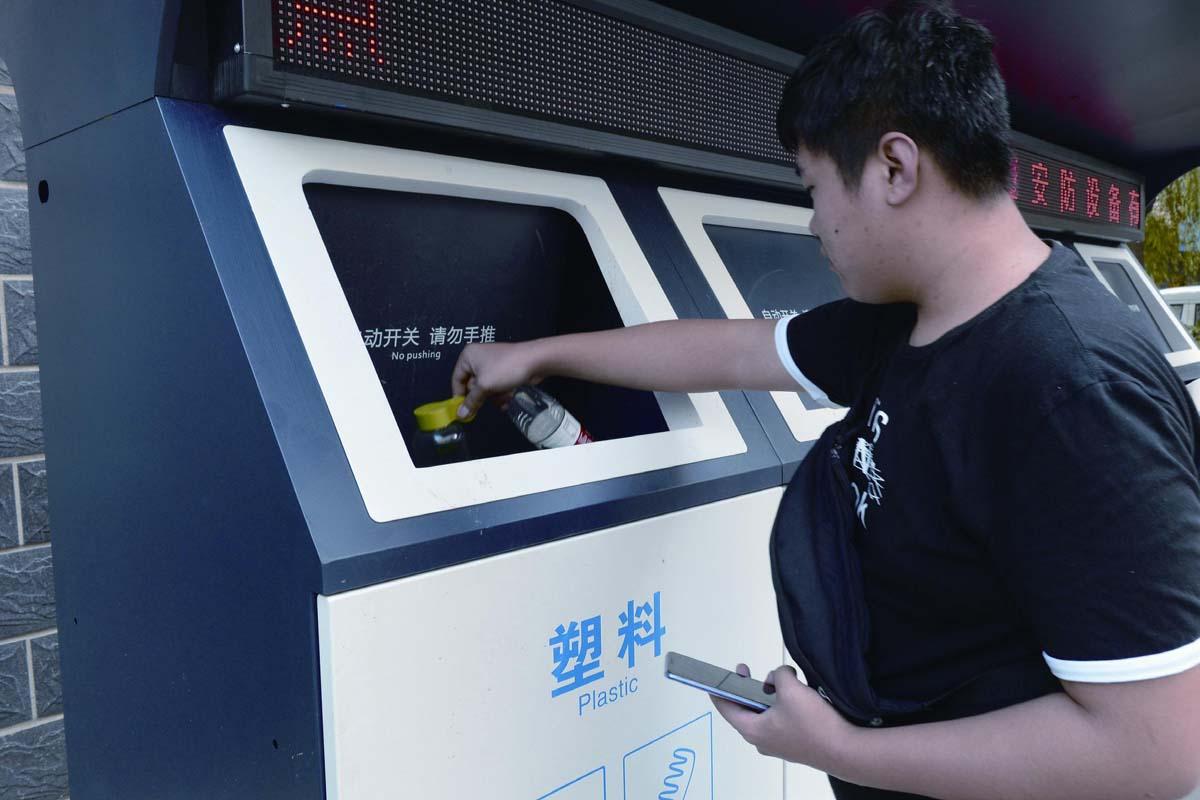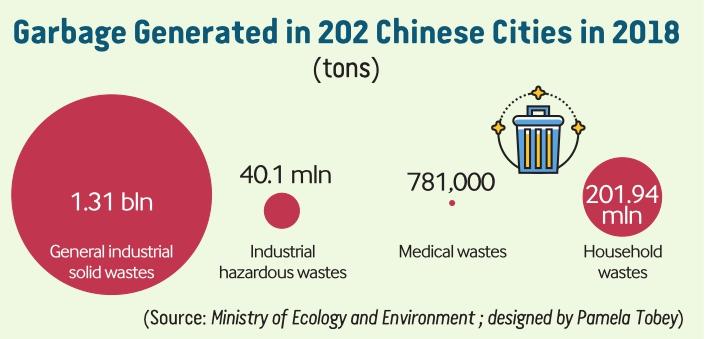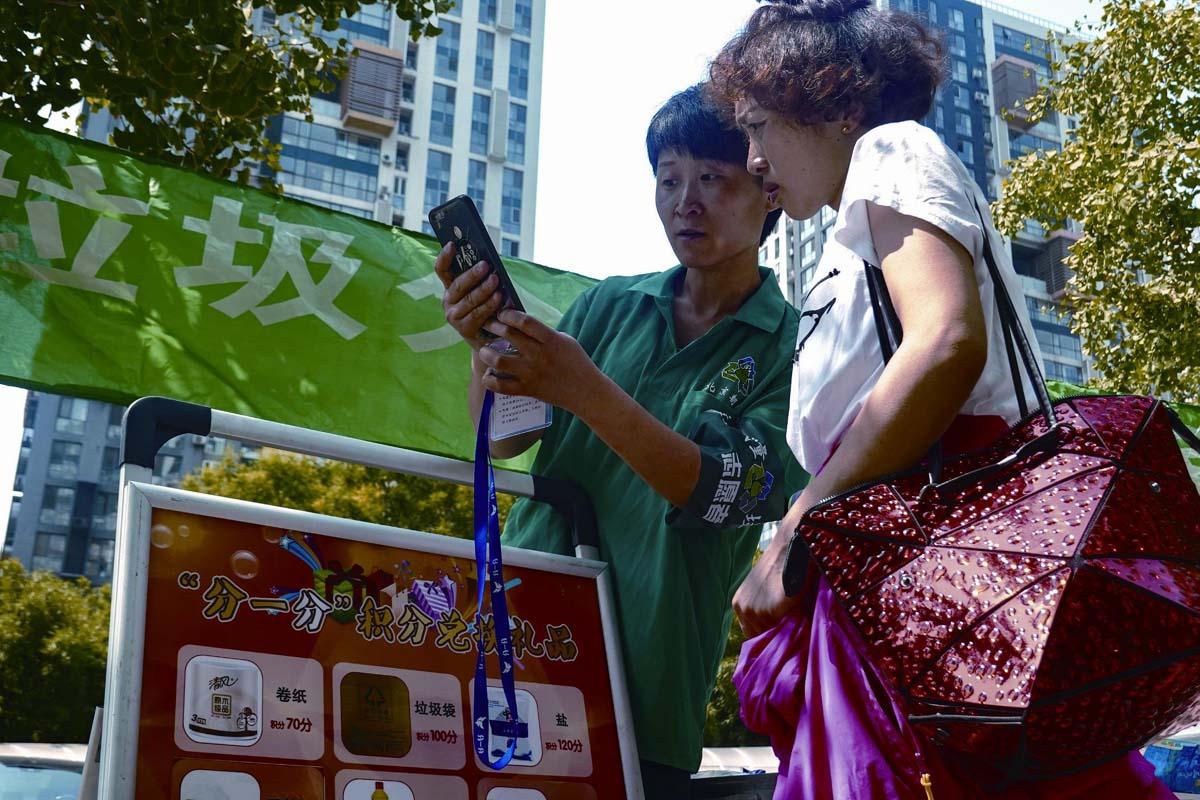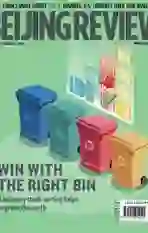A USE FOR REFUSE
2019-09-02ByLiNan
By Li Nan



Swipe, dump and get rewards. These are the three basic steps to dump sorted garbage in smart bins in Beijing and Li Ping, a 77-year-old Beijing resident, has mastered the procedure after three years of practice.
According to Li, every resident in her community has an online “green account”with its unique QR code. The bin doors open only when one uses the unique code to activate the green account. But before you can put the trash in, on-the-spot supervisors will see if it has been correctly sorted into different piles. Once they give the thumbs-up and the trash bags are dropped into different bins, bonus points are added to your online account, to be accumulated and exchanged later for articles of daily use.
“Its a good way to encourage residents to handle garbage properly,” Li told Beijing Review. Also, the smart trash bins get sealed automatically and the unpleasant odor stays inside. “The environment and air in our community are much cleaner now,”she said.
In 2016, smart bins were introduced in several residential communities in Beijing as a pilot move to encourage garbage sorting. By the end of 2018, garbage sorting had been implemented in more than 30 percent of the citys sub-districts. The number is expected to triple by the end of 2020.
Carrot and stick
Beijing was among the first eight Chinese cities to introduce garbage sorting in 2000. Twelve years later, a regulation was rolled out in the capital to manage garbage sorting in governmental departments, property management company offices and trash disposal units.
However, the result was not satisfactory since garbage sorting was not mandatory and the incentives were not strong enough to win over the masses, according to Wu Xiangyang, an associate research fellow with the Beijing Academy of Social Sciences.
Consequently, the capital is overloaded with garbage. Nearly 2.6 tons of household wastes are produced in Beijing daily, 1.1 kg per capita per day, according to Sun Xinjun, head of the Beijing Municipal Commission of Urban Management (BMCUM). “That number keeps increasing,” Sun said. Therefore, all the garbage disposal facilities in Beijing have to be run full throttle around the clock.
Its not just a Beijing problem but a nationwide issue. According to data from the Ministry of Ecology and Environment (MEE), nearly 202 million tons of household waste was generated in 2018.
But garbage sorting can address the problem. Hence 46 cities, including the big four, Beijing, Shanghai, Guangzhou and Shenzhen, will have to introduce mandatory garbage sorting by the end of 2020.
“Its an unprecedented step. Mandatory garbage sorting becomes a national operation. It shows Chinas resolve to protect its environment,” Wu Zhenglin, General Secretary of the Xiamen (Siming) Environmental Protection Volunteer Alliance (XEPVA) from southeast Chinas Fujian Province, told Beijing Review.
On July 1, Shanghai became the first city to make the pioneering move to make waste classification mandatory. According to Shanghai regulations, the waste has to be divided into four categories: wet(kitchen) waste, recyclable (dry) waste, toxic waste and others.
“It is a significant step because it makes garbage sorting a legal duty rather than a voluntary act,” Liu Xinyu, an associate research fellow with the Shanghai Academy of Social Sciences, said.
Its a carrot-and-stick regulation. On one hand, there are incentives. Residents who sort their garbage well are rewarded with bonus points which can be redeemed for gifts or services, such as riding sharing bikes without having to put in a cash deposit.
On the other hand, individuals and companies that dont sort their trash will be fined anything between 200 yuan ($28.5) and 50,000 yuan ($7,125). By the end of July, Shanghais urban management arm had issued more than 870 tickets, slapping offenders with fines.
And it did the trick. In July, Shanghai picked up 14.8 percent more kitchen waste and 9.68 percent more recyclables than in June.
Now Beijing is mulling an amendment to its garbage sorting law. “When the new law takes effect, it will become illegal not to sort your garbage. The minimum fine for offenders in Beijing will be not less than 200 yuan,” Sun said.
Tailored approaches
Tailored measures are encouraged when introducing garbage sorting in different places, like urban and rural areas. Creating a closed-cycle process is an effective measure for rural areas. It means turning kitchen waste into organic fertilizer and using it in agriculture. Xinzhuang, a village in north Beijing, is a shining example.
The 2,000 villagers make their living by growing strawberries in greenhouses Before 2012, the village put all its garbage in a pit 667 square meters large and just a few dozen meters deep. Though expected to hold the villages waste for a decade, it was almost full after just four years. There were adverse effects like some livestock dying after eating plastic bags from the heaped garbage.

Primary Party organizations also play a key role in garbage sorting. “Members of the CPC are bellwethers in garbage sorting,” Wang Ying, Director of the Baiziwan Neighborhood Committee, told Beijing Review. Party members actively take part in garbage sorting and set examples for their neighbors and relatives, Wang said.
Volunteers are also an important advocacy force for garbage sorting. They often consist of retirees. For instance, there are more than 100 volunteers in the Post Modern Resident Community in east Beijing, who are connected through an online group on WeChat, Chinas most popular instant massaging app. Messages about garbage sorting and other activities reach all members simultaneously and reverberate through the entire community. Li is part of the group. “When hanging out with friends and neighbors, we remind them to sort the garbage,” Li said.
Schools have also begun garbage sorting education. In Xiamen in Fujian, there are three kinds of handbooks instructing youngsters aged between 3 and 18 how to distinguish between different kinds of waste. Middle schools and kindergartens are organizing talks and other activities on trash sorting.
“It was my eldest son who told me that used button battery is toxic waste while dry battery is other waste,” Xiamen resident Liao Zhenrong said with maternal pride.“My two kids are now acting as my garbage sorting supervisors.”
“Garbage sorting may seem like a government task to improve peoples livelihood but its actually a step to change citizensbehavior,” XEPVAs Wu told Beijing Review.
Miao Guiqing, Deputy Director of Beijing Chaoyang Circular Economy Industry, echoed Wu. “We need to change our way of life,” Miao said.
She said there are two ways to live a low-carbon and environment-friendly life. All garbage should be dealt with in a scientific and environment-friendly way. Also, one should use things as long as possible and minimize the generation of garbage. “Waste classification is important but waste reduction is even more important,” she said.
